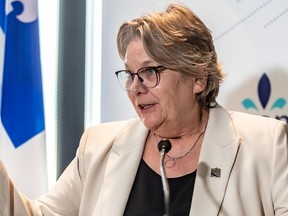They say “the plan condemns people in poverty to stay there.”

Nearly a month after the Quebec government tabled its fourth anti-poverty plan, the anger of community organizations is hardly abating.
On Tuesday, four major organizations whose concerns affect people on social assistance, collective kitchens, homelessness and accommodation for young people in difficulty denounced the plan, which they consider “disappointing and insensitive toward people in situations of poverty.”
The government action plan to combat poverty and social exclusion 2024-2029 was quietly presented on the Friday before the Fête nationale long weekend. Chantal Rouleau, the minister of Social Solidarity and Community Action, made no announcement and simply posted the plan on the Quebec government website.
The organizations have denounced the fact that it only has a budget of $750 million, a quarter of the previous plan of $3 billion.
The groups — the Common Front of Socially Assisted People of Quebec (FCPASQ), the Regroupement des Auberges du Cœur du Québec (RACQ), the Regroupement des cuisines collectives du Québec (RCCQ) and the Assistance Network for Single and Itinerant People of Montreal (RAPSIM) — are protesting against the fact that this is “the only plan not to propose any new program to improve the income of people in situations of poverty,” along with being devoid of clear objectives to reduce poverty in Quebec.
They say “the plan condemns people in poverty to stay there — first of all, by not providing any new measures to help (them) deal with the housing crisis.”
They also criticize Rouleau for focusing on food support organizations, seeing there a tendency to maintain “the dependence of vulnerable people rather than strengthening the food autonomy that they desire.”
As for the addition of the work income supplement, which they initially describe as “very meagre,” they criticize the government for refusing to “take the full measure of the inability of certain people to find and keep work.”
The minister’s office was quick to react, relaying her comments by email.
“I am aware that many Quebecers are going through a difficult time due to the rising cost of living, particularly those receiving social assistance programs,” she wrote, saying she was still “listening to community groups.”
She said her government has invested, since 2018, “more than $12 billion” to act on poverty, in particular for construction of social or affordable housing, improving programs supporting rent payments, raising the threshold of exclusion linked to alimony and increasing the tax credit for seniors support.
The minister said her objective remains to “lift people out of poverty.”
Community organizations, however, deplored the fact that there are no measures to increase the income of poor people, the only way, they argue, to get them out of poverty.